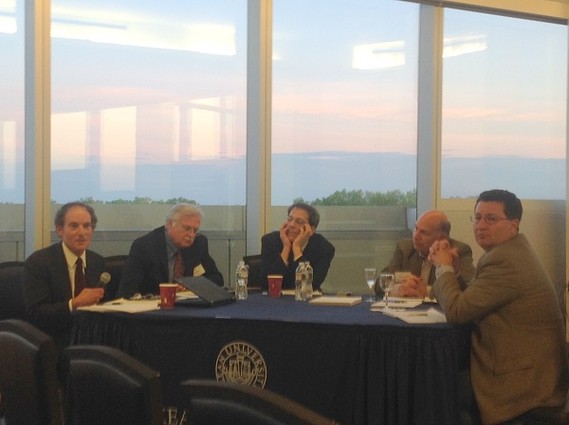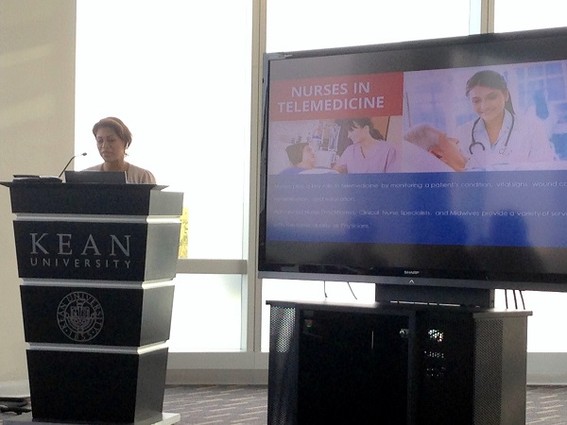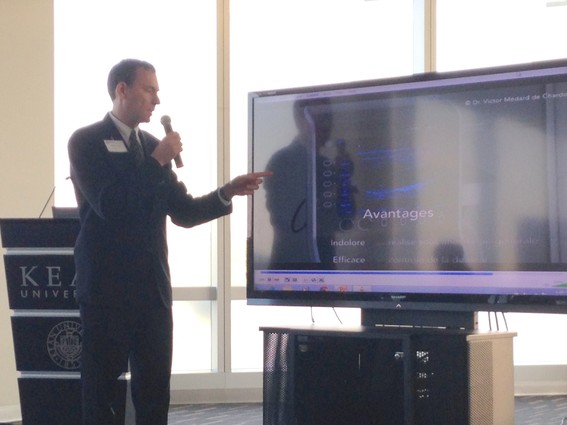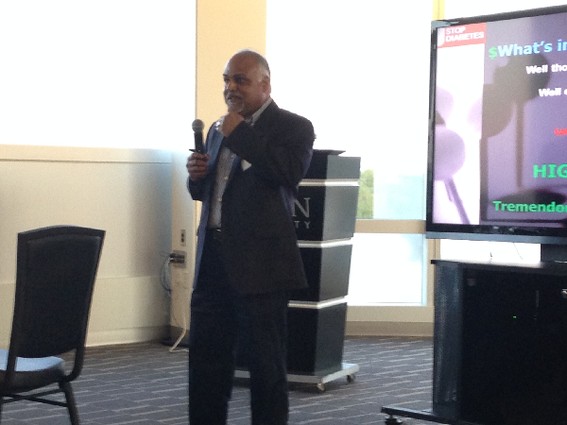UltraVision Wins “1st Pitch Life Sciences” Event at Kean University

In recognition of the blossoming life-science entrepreneurial community in New Jersey, 1st Pitch Life Sciences came here for the first of what will hopefully be many events in the Garden State.
Organized by Mid Atlantic Bio Angels (New York), a life science investor group, 1st Pitch Life Sciences provides an opportunity for aspiring life-science entrepreneurs to practice their pitches in front of experienced professionals and an audience, and to receive constructive criticism from both.
The event took place at Kean University, and followed the 1st Pitch Life Sciences format, which is straightforward, while at the same time unique:
- 15-minute presentation by the entrepreneur
- 10-minute session for audience questions
- 10-minute discussion among the investors concerning what they liked about the presentation and what problems they perceived, with the entrepreneur and the audience listening, but not participating
- The audience vote for “Best in Show,” at the end of the event
The winner is entitled, not only bragging rights, but to a press release funded by MABA; a polo shirt proclaiming him/her as the winner; and, finally, the opportunity to participate in the “Best of the Best” competition, which has not yet been scheduled.
Three companies pitched at the Kean event: TeleNurse Network, UltraVision (whose website appears to be under construction) and ARKAY Therapeutics.

The first to present was TeleNurse Network (Newark), which was founded by Marisela Cigliuti, B.S.N., R.N., and is a brand new startup that is already receiving national attention, including conference and incubator invitations. TeleNurse’s goal is to provide patients with remote access to specialty nursing through the use of video chat services.
The concept is that nurses with specialized skills could be made available remotely to a medical office that would otherwise have to refer the patient elsewhere or hire someone with the relevant expertise.
It is a win-win situation for everybody: A doctor’s office can inexpensively hire the expertise on an as-needed basis, the nurses can earn extra money to supplement their incomes and the patients can have access to specialty nurses from their homes.
Ultimately, the goal is to capitalize on the ever-increasing number of states (New Jersey is not one of them) that have billing parity regulations allowing medical practices to bill for telemedicine services in the same way that they would for in-office visits.

Next to pitch, and the audience’s choice for “Best in Show,” was Allen Maizes, M.D., of UltraVision. He invented a patent-pending technique for visualizing where the contents of an injection are flowing inside the patient’s body. Dr. Maizes invented an innovative insert, designed to be combined with existing syringes, that creates turbulence visible through ultrasonic imaging, allowing the clinician to know exactly where the fluid is going, and to verify if medicine is being delivered exactly where the clinician wants it.
The last to present was Ravi Kumar, Ph.D., the founder, president and CEO of ARKAY Therapeutics, which has a portfolio of 50 patent-pending 505(b)(2) formulations that it hopes to bring to the market. These are proprietary formulations of already approved drugs on the market.

While presented as “personalized” medicine, ARKAY Therapeutics is really a step toward “segmented” medicine. The company has identified very clear entry and exit criteria for each formulation, with the first indication combining anti-inflammatory formulations (typically associated with obesity) with pre-approved metabolic-disease drugs to treat specific comorbidities (e.g., diabetes).
The 505(b)(2) process will allow ARKAY Therapeutics to get at least three years of exclusivity for each formulation approved. By adding more and more formulations each year from their 50 patent-pending formulations, the company anticipates generating prolonged and sustained growth.
After each presentation the audience asked questions and then the panelists began questioning in a very frank and open manner. As this was a first opportunity for some of the entrepreneurs, anddesigned to be learning experience, the comments of the panelist have been grouped together.
The panelists were Kenneth B. Kashkin, M.D., chief operating officer of Chromocell Corporation (North Brunswick); Keith A. Bostian, Ph.D., interim CEO of the Institute for Life Science Entrepreneurship (Union); Bruce Toman, technology licensing officer at Cornell University’s Center for Technology Licensing (Ithaca, NY and New York City); Yaniv Sneor, cofounder of the MABA and president of Blue Cactus Consulting Group; and Richard J. Colosimo, Esq., of OlenderFeldman LLP (Summit).
The comments of the panelists are presented below grouped together as general advice for entrepreneurs rather than as responses to particular presentations:
Kenneth B. Kashkin:
- Providing an overview of the competition is very important because it educates the investor about both the industry and how you’re approaching the business.
- When patents are important, focus on how broad the protection you’re seeking should be, and maybe even go into claim structure.
- Your job is to convince the investor that the business model works (as many investors are willing to accept the clinical model as valid).
Keith A. Bostian:
- Every question is a golden opportunity.
- Saying that “no one else has done it” is a dangerous move because it brings into question your credibility.
- If you have the CV, highlight it; then you can shorten your discussion of the clinical details, and instead focus on the clinical story.
Bruce Toman:
- Many startups need a business partner because entrepreneurs often want to create a product or business for themselves, rather than one based on the business model.
- Be willing to say “I don’t know,” rather than bullshitting, which decreases credibility.
- Don’t try to make your product more than it is.
- Don’t just give the big numbers, also give the segmentation.
Yaniv Sneor:
- Put yourself in the shoes of those who will benefit.
- If you are not addressing the business yourself, then you need to explain who on the team will focus on it.
- You can’t skip the question of clinical strategy; instead, you should address it quickly so that you can focus on the business itself.
Richard J. Colosimo:
- Have a concrete story that shows both the big picture and how the business will function in the near term.
- At least hint at the exit possibilities, so that the funders will understand where you want to go.
- Use your expertise to sell your pitch when answering questions.
- Talk about what you will do with the money.
- Most importantly, don’t oversell your product because that will destroy your credibility.

